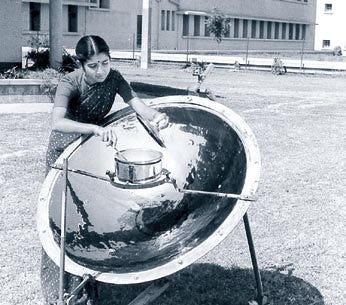Independent India's first failure
The Solar Cooker was Nehru's pride... until ambition met reality
Hi there,
Today's post tells the story of India's first homemade product that failed spectacularly on the world stage.
Could things have been done differently?
Are we repeating the same mistakes 70 years later?
Let's find out.
Sun-Cooked Vegetables
On 21 March 1952, Indians awoke to news that Prime Minister Jawaharlal Nehru had eaten cabbage and steamed vegetables for dinner.
This was no ordinary meal.
Nehru, the Times of India reported, had savored 'sun-cooked' vegetables, thanks to a solar cooker installed in the Prime Minister's residence.
Harnessing the power of the sun
The solar cooker, developed by the National Physical Laboratory (NPL), utilized the heat from the sun to cook food without requiring any other fuel.
Its design featured a parabolic reflector that concentrated solar energy at a focal point on which the cooking pot was placed. The apparatus, mounted on a stand to withstand wind load, promised to revolutionize cooking in rural India.

The invention garnered support from influential figures such as PM Nehru, President Rajendra Prasad, and eminent scientists like Shanti Swarup Bhatnagar, the director of the Council of Scientific and Industrial Research (CSIR). Homi Bhabha, one of the foremost physicists of the time, noted the solar cooker's potential to free India's agrarian community from its reliance on cow dung for fuel.
The belief was that if rural women switched to using solar cookers, their dependence on cow dung and firewood would decrease, freeing these resources for other productive uses such as manure and fertilizer.
The idea of harnessing solar energy for small-scale, daily uses like cooking in the Third World became so popular that it caught the attention of President Eisenhower's administration in 1954.
The harsh sunlight of reality
However, the solar cooker failed to take off for multiple reasons:
Cooking with the contraption was labor-intensive and time-consuming, yielding limited results. It wasn't practical to prepare breakfast just after sunrise when most laborers and farmhands were heading out for the day's work.
The aluminium sheets used as a reflector surface were not durable.
It required constant repositioning to catch the sun, making it unwieldy to use.
The cooker was useless during cloudy or rainy weather and at nighttime.
At Rs. 50 (then equivalent to $16), it was prohibitively expensive for the rural market.
Most importantly, the rural women who were the solar cooker's primary market were never consulted— they found the cooker cumbersome and inefficient.
After three years of hype, reality dashed hopes for the solar cooker.
Lessons we can take for our current Aatmanirbharta push
The solar cooker project was conceptualised with the noble intention of reducing India's dependence on imported fuel by harnessing the abundant and free energy. But it backfired.
It called into question the credibility of the political leadership and the reputation of many in the scientific establishment.
The narrative of Indianizing technology and achieving self-reliance (Aatmanirbharta) took priority over practical considerations.
While many scientists in the developed world had tried to harness solar energy, they struggled to translate it into practical applications. The Indian project would have benefited from understanding why these previous attempts had not succeeded.
Policymakers advocating for Aatmanirbharta today should take note of this historical lesson.
We must first conduct user-level research to develop and implement solutions that meet their needs. Balancing ambitious goals with user-centric design and practical implementation is key to meaningful innovations for Aatmanirbharta.
I found this story in the book Midnight’s Machines: A Political History of Technology in India by Arun Mohan Sukumar. The author goes on to explain how this incident rewrote the way citizens and the government view scientists and technology for decades to come.
If you enjoyed this newsletter do consider sharing, liking, or commenting! Preferably all three. Thanks!
Filtered Kapi #59




Great post Aditi. Practicality, cost and convenience eventually triumphs every other reason for positive change.
Damn this is such an interesting post. Just found your newsletter and I am hooked, Aditi. You’ve gained a subscriber!